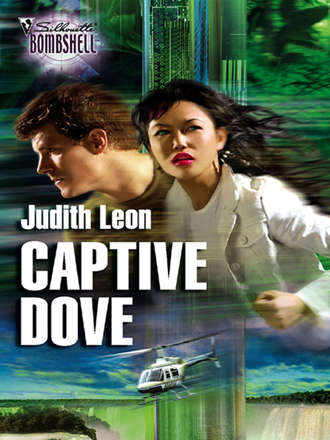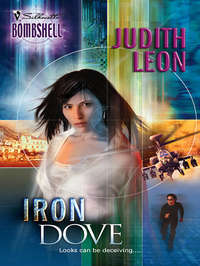
Полная версия
Captive Dove
He’d been so surprised. She felt another rush of sadness mixed with guilt. Breaking up right before Christmas and New Year’s had seemed especially unkind. On the flip side, maybe at some big holiday party David would meet someone new. Someone to make his life complete.
She leaned over the couch to pick up Divinity, her white Angora cat, a treasure with one green and one blue eye. She scratched gently behind one of Diva’s ears. “Time to visit Penny, sweet thing.”
She left the condo’s door ajar and strolled along her balcony to Penny’s door. Their two condos took up the three-story building’s top floor.
Today’s gorgeous blue-skied weather in San Diego could not be bettered any place in the world she’d been to, and from working for the Company and Cosmos Adventure Travel, she felt like she’d visited an impressively large selection of the planet’s offerings. Sunny, clear, a pleasant eighty-two degrees.
To her left, the Pacific Ocean beckoned, framed by four palm trees. A pleasant December day in exclusive and beautiful La Jolla, named “The Jewel” for its beauty and perched on the coved edge of the sea. Seven days before Christmas.
Reginald Pennypacker, her closest friend, was an African-American with delicate, Ethiopian bone structure and large, dark eyes. Penny owned La Jolla’s most exclusive beauty salon and, bless him, he took care of her plants and Diva upon request, no advance notice—something that happened rather often.
Today, Nova didn’t even need to knock. She’d told him weeks ago about the New York trip. Apparently hearing her steps, he flung open his door and stood there, regally dressed in a gold jogging suit with black trim.
“Come to me, precious one,” he commanded, lifting Diva from her arms.
“Back in three days,” she said.
“Right. And if not, you’ll call.”
He smiled and studied her face to see if she had further suggestions or requests.
She hugged him and offered her half of their ritual parting. “Don’t do anything I wouldn’t do.”
“I intend to do a bunch of things you’d never do,” came back his reply.
She turned and saw the Airport Shuttle service pull up. Now it was off to New York and sell, sell, sell.
Chapter 4
C IA field agent Joseph Cardone unbuckled his seatbelt. He should have been tired but instead he felt “fired up and raring to go,” one of his father’s expressions. Within the hour he’d be driving on a summer evening through moon-washed Texas sagebrush, soaking up vistas from a childhood that had been damn near perfect. He’d grown up in a loving family on a Texas ranch, where he’d ridden horses, milked cows, mended fences, driven a tractor, and baled hay. He was almost home.
The man next to him in first class, an oil exec also returning from Baghdad to Houston, had the aisle seat. They stood, and the man opened the overhead bin and pulled out his briefcase. Like Joe, the exec had traveled casual: chinos and a short-sleeved shirt, white for the exec and a light blue for Joe.
“It’s been damn pleasant sharing the hours with you,” the exec said. He stuck out his hand and Joe shook it. “You decide to come into town for some fun during your stay, give me a call. Or if IBM ever sends you to Houston on a troubleshoot. I’d love to show you around.”
IBM troubleshooter was Joe’s cover identity, and he would never take the likable guy up on his offer of hospitality. CIA business was Joe’s real life, one that occupied virtually all of his time. He had no idea where the Company would send him next, although it sure wouldn’t be Houston. “Like I say, I’m just here for a few days for my brother’s wedding. Family stuff. It’s not likely I’ll get away from my folks’ ranch or into any town other than Placita. That’s where the church is.”
At the door leading from first class into the Boeing 737’s exit, the flight attendant on this leg out of Baghdad pressed her business card into Joe’s hand. She said, “I don’t fly out again for four days.” He flipped the card over and checked the back. Sure enough, there was her phone number.
He smiled and used his forefinger to touch the tip of her chin. “I don’t know my schedule right now. But thanks for great service.”
He pocketed her card and strode down the gangway.
There had to be sixty or seventy people waiting for arrivals, but drawn by the unerring pull of maternal love, the first face that registered was his mother’s. Rosalinda Cardone. She stood next to his brother, Manuelito, and seemed to glow from within, her smile identical to the one for which Joe was legendary among CIA colleagues of both sexes: brilliant white teeth, sensual lips.
He dropped his overnighter as she embraced him, plump arms hugging his waist, her head pressed hard against him. Standing on tiptoes, her head came to his midchest.
He closed his eyes and let a warm sensation spread up his neck to his face. He was flushing with happiness. And something else. Some powerful feeling. This is absolutely the only place in the world where I am safe.
His mother pulled back enough to look up at him. His eyes were dark brown with some gold flecks, like his father’s. Hers were deep pools of velvet black from her Spanish heritage. “Your muscles are firm enough, but you are too skinny, Joseph,” she said.
He laughed and kissed her on the forehead. “You are my home.”
“Been too damn long,” Manuelito said, grabbing Joe into a bone-crushing hug.
“And how’s Dad?” Joe asked.
His mother took his hand. “He’s fine, he just didn’t want to wrestle the wheelchair through the airport. He’s waiting for us at the ranch.” His bullock of a father had finally been broken by a car accident that had robbed him of the use of his legs.
Joe checked out Manuelito, head to toe. Levis. Red shirt. Black, well-worn cowboy boots. He’d let his hair grow long and wore it pulled back in a ponytail, Antonio Banderas style. It looked good. When they were young they were often mistaken for each other. Same dark brown wavy hair, light brown skin, brown eyes, and quarterback physique.
Joe at thirty still had rock-hard abs. He patted his twenty-eight-year-old brother’s midsection, softer-looking than the last time they’d been together. “Well, Manuelito, looks like you’re ready for marriage, all right.”
“You bet. Time for the really good life.” His brother picked up Joe’s overnighter.
“I can get it,” Joe said.
The ride Joe had been imagining took place in the cab of a beat-up Chevy truck, Manuelito driving, Joe riding shotgun and their mother in the middle. Life could sometimes be so damn good.
Chapter 5
P araguay. A landlocked country in the heart of the South American continent.
In area, slightly smaller than California.
A country that in the east had grassy plains and wooded hills; in the west, low dry forest and thorny scrub in the vast, sparsely inhabited emptiness of the Gran Chaco; and that in the extreme east, possessed a magnificent strip of tropical rain forest where Paraguay shared a border with Brazil and Argentina.
In Paraguay, Tomas Morinigo Escurra—born in Manaus on the Rio Negro in northern Brazil—found refuge at the age of fifteen, after he killed his first man.
According to the CIA World Factbook on Paraguay:
Population—95% Mestizo.
Languages—Spanish and Guarani.
Capital—Asuncion.
Religion—97% Roman Catholic.
Government—constitutional republic.
Economy—poor economic performance attributed to political uncertainty, corruption, lack of structural reform, internal and external debt and deficient infrastructure.
International Disputes—an unruly region at the convergence of the Argentina-Brazil-Paraguay borders that is a locus of money laundering, smuggling, arms and drug trafficking, and fund-raising for extremist organizations; a major illicit producer of cannabis; a base for transshipment of Andean (Colombian) cocaine headed for Brazil, other Southern markets, Europe, and the U.S.; and a center for corruption and terrorist money-laundering activity, especially in the tri-border area.
In the years that followed his arrival from Manaus, Tomas Escurra hacked out success and imposing wealth in his adopted country, working as a hired hand, then a small rancher, and finally he married a rich man’s daughter and became a legitimate cotton grower. Later, he moved into more lucrative endeavors, ones more challenging and exciting—his specialty: drug smuggling. In his younger years he had also gained fame as a champion practitioner of capoeira, the distinctive martial art of Brazil, a combination of music, dance and fighting. But that time of young glory now lay thirty years in the past.
Six days before he would celebrate the birth of Christ by throwing one hell of a huge party for local honchos from hundreds of miles in every direction, Escurra was hosting a dogfight at ten o’clock in the evening for his soldiers. He’d built this fighting pit on the grounds of his massive Rancho Magnifico, half a million acres hacked out of the jungle on the Brazilian side of the tri-border area.
He sat in his place of honor surrounded by shouting, swearing, cheering, unwashed men watching a German mastiff and a German shepherd tearing each other to death. And days hence, on Christmas Eve, while the local VIPs wined, dined and danced at his home, his less savory business partners would enjoy an even more exciting blood sport. Naturally, he had cocks and dogs lined up, but a pair of human fighters would be selected too, the final choice made only the day before the event.
The smell of beer and marijuana was enough to get high without even taking a hit. He’d put his money on the mastiff. The German shepherd lay whining and writhing on the ground in a messy pool of its own blood mixed with arena dirt. Escurra leaned forward. Finish it! he thought, his pulse pounding warmly at his throat, his passion with the mastiff. Escurra would win his bet. He usually did.
This rough fighting complex was comprised of wooden pens for dogs, cocks and even men—for special, highly secret events, such as those on Christmas Eve—plus a viewing stand. The viewing stand was part of an arena his men could enlarge for the bigger contests or make smaller for the cockfights.
The fight was over; the dogs were being hauled away. Escurra checked his watch. He’d not heard from Felipe, not one word about the Manaus operation. The operation had been planned down to the finest detail, but experience had long ago taught him that it was impossible to control everything, hence his anxiety.
Rodrigo, the man seated beside him, was Felipe’s brother and Escurra’s cattle manager. Rodrigo said, “He will call, jefe. Felipe is smart. Don’t worry.”
Rodrigo knew everything about raising prize beef, as well as the ins and outs of Escurra’s many illegitimate projects. “Felipe’s smart, Rodrigo, but it’s a different kind of cargo we’re dealing with this time.”
The Casa Grande, where Escurra lived with his wife and youngest daughter, lay only minutes away by private road or by golf cart across perfectly manicured lawns. He really ought to go, now, to say good night to them. Early tomorrow, both women would leave for the States to visit his wife’s family in Washington, D.C., for Christmas and New Year’s. They went every year. They much preferred the sophistication of Washington, plus holiday shopping in the expensive boutiques in New York, to the rough people and countryside celebrations of this isolated island of jungle in Brazil.
Convention required that he say good night and pretend that he would miss them. He wouldn’t. He’d learned young that he was different from other people. Stronger. He didn’t need anyone. He wouldn’t miss anyone. He cared for no one—but himself.
Such lack of feeling had to be cleverly disguised, though, in order to be successful, because if it weren’t, you couldn’t get people to trust you. You could achieve greater success if you used fear, or as he liked to think of it, respect and trust, in dealing with others. Whichever worked best in the circumstance. He knew how to work people, had been fucking brilliant at creating a benevolent, honest facade as local benefactor and charitable giver.
He stood, saying to Rodrigo, “I need to go say goodbye to the women.”
To reach Casa Grande he would drive past tennis courts, three guest rancheritas, a pool and spa, the helicopter pad, and various other buildings for workers or supplies. He seated himself in the golf cart and his cell phone vibrated, the one with the direct and secure line to Red Dog, his main business contact in the States. Quite a number of U.S. covert operations were funded by drug money. Ordinarily, Felipe made all contacts and arrangements with Red Dog, the code name of this extremely highly placed man in the U.S. military whose actual identity remained a secret, even from Escurra.
For over five years, Red Dog had provided cover for Escurra’s drug smuggling into the U.S., always taking a big cut. Escurra had never discovered how Red Dog had found out about the drug smuggling, but Red Dog had made an offer that Escurra could not refuse: cooperate and share profits or Red Dog would expose his operation to Brazilian authorities. Then a month ago, he had approached Felipe about this crazy operation involving kidnapping and blackmail.
Escurra would have opted out if he could have. Smuggling drugs he knew from every angle, but kidnapping and smuggling people was new; doing something new entailed major risks and invited disaster. Triply so because so many well-connected Americans would be involved.
Red Dog, however, refused to accept his no. Furthermore, the American implied that he might find some other middleman who was more cooperative. Fuck all. So much of Escurra’s business now depended upon this contact. How could he refuse the operation? Even Red Dog’s sweetening the pot with the promise of two million dollars didn’t make the deal sit any better in Escurra’s gut.
He fished the cell phone from his pocket. “The Eagle,” he said in English.
In his capoeira fighting days, his insignia had been a harpy eagle in flight clutching a dead colobus monkey in its talons. The harpy eagle—biggest eagle in the world. All who knew and feared Escurra still used the nickname behind his back. He had found it amusing to use it himself with the American.
“I was told I’d get a call by nine o’clock your time.” The low, tense voice was that of Red Dog. Escurra had personally talked only three times with the main man. Never before had Red Dog sounded agitated, angry or even tense. He’d always impressed Escurra as one very fucking cold Americano.
Escurra said, “I haven’t heard from my operative yet.”
“Has something gone wrong?”
“How can I know? I told you, I haven’t heard from him yet.”
“I don’t like it.”
“I can’t help that. I sent my best people, led by the man you usually talk to. When I hear from him, I’ll call.”
A long silence stretched to the point where Escurra said, “You still there?”
“I’ll be waiting.”
The connection went dead.
Escurra sat thinking about that strained sound in Red Dog’s voice. Maybe Red Dog was the top man in Washington. Maybe not. Maybe he reported to someone with even more power. Escurra would have to do a lot more thinking about that. But one thing for certain, Red Dog wanted those hostages much more than he had ever wanted profit from drugs. Somehow, for some reason, Red Dog was vulnerable. If all went well, Escurra would demand more money.
Just as he reached the main house his other phone vibrated. He answered.
Felipe said, “Your packages have been picked up and are on their way. Anything new for me?”
“No. Just get your ass back here.”
Chapter 6
T he priest was explaining to Joe’s brother, Manuelito, and his bride-to-be, Susa, exactly where to stand and what to say tomorrow during the actual wedding. Joe, along with the rest of the wedding party, stood in places lined up near the altar.
Joe’s youngest brother, Diego, and two other friends of Manuelito’s who would serve as ushers, stood on one side of Joe. On the other side of the bride-to-be, the bridesmaids were whispering among themselves, but the priest, Susa and Manuelito seemed not to notice. Joe stood facing the entry.
For a moment, as he looked down the rows of pews toward the door, he imagined the seats filled with people, the bride’s processional music playing and Nova dressed in a white gown and veil walking down the aisle toward him. He chuckled to himself. Actually, in his mother’s worldview, white would be entirely the wrong color for Nova. No virgin there. Light-years from being a virgin. Maybe Nova, the seductress, should be wearing red. Or maybe even black. Nova had eliminated bad guys, and more than once.
Then a different image replaced the wedding scene, a memory of sitting across the table from her in a funky little restaurant smelling of cinnamon. Their last weekend together. She’d picked a bed-and-breakfast in a tiny mountain hamlet called Julian, northeast of San Diego, a place famous for apple pie and the orchards that produced them. A place where the two of them could be assured of anonymity. He was holding her hand across the table.
He had presented her with an engagement ring, fully expecting her gorgeous green eyes to light up with joy. Instead they had dimmed as though a gray cloud had suddenly covered his sun. Nothing he’d said could change her mind. She’d quickly grown angry, saying he’d agreed they would be lovers. But no big commitment like marriage. He’d grown angry in response. They had locked in a test of wills. He’d finally said, “Either marry me, or I’m outta here.”
Her reply, as she’d pulled her hand out of his, her tone both sad and final had been, “Then, I guess it’s over.”
Now, clenching his fist, Joe swallowed down a golf-ball-sized lump and forced his attention to the priest. A dumb phrase popped into his head—“Real men don’t cry.”
He had actually found and loved a woman like no other. He would never love another woman because in his eyes, none would ever compare to Nova in beauty, intelligence or courage. So why the hell had he insisted on marriage? Why the hell had he let her push him away? And just when the hell was he going to swallow his pride and call her?
Chapter 7
N ova’s photo agent, Deirdre LeDoux—her name matched her flamboyant looks—stepped onto the squat platform at the Franke Gallery of Fine Photography. She’d piled her blond hair up in dramatic swirls and wore a purple, floor-length Dolce & Gabbana that would also be smashing on her look-alike, Charlize Theron. The string quartet had just finished playing Vivaldi’s “Spring” Concerto and fell silent. Deirdre said huskily into the microphone, “May I have your attention, please.”
The one hundred invited guests cruising the gallery floor, most of them dressed in black tie or a gown equal to Deirdre’s, turned toward Deirdre and wound down their chitchat. A last sip of champagne. A final bite of foie gras or Russian caviar.
Deirdre had explained that half the guests were already Nova Blair collectors, eager to meet the photographer and perhaps buy something new from Nova’s collection of Scenic Ocean Drives of the World—at prices ranging from one thousand to fifty thousand dollars. Nova always felt squeamish about the prices Deirdre insisted upon. Taking the pictures was its own payoff in the pleasure she derived from it, even when capturing the image involved danger or hardship. Especially then. But, as Deirdre relished repeating, when hazard and beauty were brilliantly combined they merited very special recognition. Such works always brought the highest prices, and Deirdre, from the beginning of their seven-year friendship, had put Nova in that elite class.
“I see you are all enjoying yourselves,” Deirdre said. “I’ve interrupted just briefly because I want to share with you, and with Nova, the announcement that her photo of A Boy and Butterflies has just been awarded The Nature Conservancy’s photo of the year. Their top prize.”
All gazes switched to Nova, and enthusiastic applause showered her. She felt the warming glow of a blush of pleasure and surprise.
Deirdre finished. “Now please, do continue to enjoy your evening.” She stepped down and slipped her arm around Nova’s waist. Deirdre’s perfume, Llang Llang Myrrh, enveloped them. The quartet resumed its mood-setting, Canon by Pachelbel.
“Nice surprise, huh?” Deirdre enthused. “Come, I want to introduce you to the mayor’s assistant. She loves photography and her husband is a nature freak. He’s always off on wilderness trips. Do what you can to sell her a photo and maybe you can sell her hubby a tour as an added bonus.”
They were halfway across the room, the two of them smiling, shaking hands and kissing cheeks as they walked, when Deirdre’s assistant, Donnie, approached. He said, “There’s a call for you, Ms. Blair. He says to tell you it’s Smitty.”
The pleasurable fizzing of her spirit flattened immediately into alarm. She grabbed at a straw of hope. Maybe it’s nothing serious.
But of course it was serious. The CIA never called her when there was “nothing serious.” To her surprise, she also felt a quick burn of excitement. Over five months had passed since her last Company assignment, and her subconscious was apparently eager for action.
“Where can I have a little privacy?”
Donnie led the way. Over the phone and sounding tense, Smith said they needed her as quickly as was convenient this evening. He gave her the name of the hotel and the room number where he would be waiting. “How long do you think you’ll be?”
“I can finish up here in thirty minutes. I’ll see you within the hour.”
She left hearing good news. “I’ve sold three photos,” Deirdre said, looking relieved. “We’ll for sure make expenses, and probably then some.”
“There were nine tourists and a guide,” Leland Smith said. “The boat captain was knocked out and tied up.”
Smith lounged in a green wingback chair opposite Nova, a hotel table between them, a Scotch and soda in his hand. He wore a plain brown suit and white shirt, tieless and open at the neck. Plain brown shoes. Plain brown hair. She had met in person with “Smitty” twice before, and each time she had had a hard time afterward remembering exactly what his face looked like. The perfect CIA field agent or controller.
Smith’s assistant, Marvin King, sat propped up in the queen-size bed with his back against the headboard. Marvin, a light-skinned black man who wore elegant gold-rimmed glasses, would never be nearly so invisible.
Smith continued. “The note that came with the severed hand says that the hand belongs—belonged—to Ellis Stone, Colette Stone’s husband, and that he’s dead.”
“The Colette Stone?”
“Exactly. So what the bastards have is nine tourists and the guide, ten hostages in all, one of them the rather famous niece of the U.S. vice president.”
“You know, I think I will have that drink,” Nova said to Marvin. He rose. She detested the vice president, who had never seen a forest he didn’t feel needed harvesting or an oil field that didn’t beg to be drained. She added, “Is the hand Stone’s?”
“Yes. Confirmed by fingerprints and DNA.”
“Who received the package?”
“Came by express mail to the secretary of defense with instructions to forward it to the office of the vice president. We might not be able to pin down the actual origin.”
“Fifty million is a lot of dollars.” She took the Scotch and soda from Marvin and sipped. Chilled. A nice burn. Marvin returned to his perch on the bed.
Smith said, “They hold major bargaining chips. In addition to Colette Stone—well—” He reached into a leather briefcase on the table beside his chair, extracted a sheet of paper from a folder and handed her a list of names. She read them, sipping the drink, as he continued. “You see Colette’s and Ellis’s names at the top. Kimball Kiff is the birding tour’s leader. Kiff’s the curator of birds at the Los Angeles County Museum of Natural History and has taken other clients on the same trip three times before.







